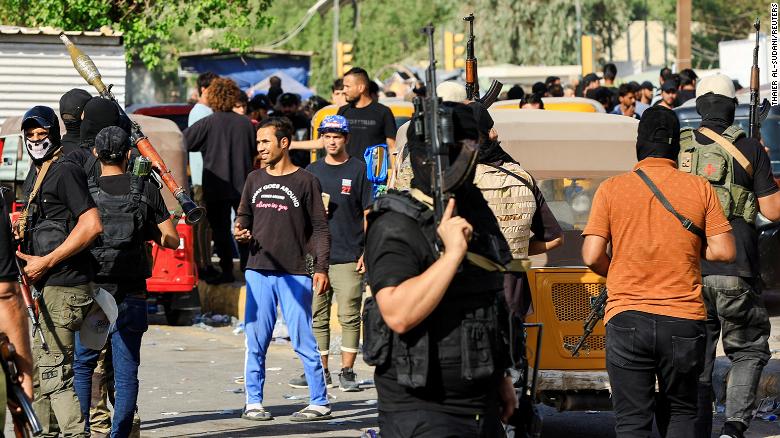
Baghdad (CNN) – Baghdad was left reeling on Tuesday from some of the deadliest violence seen in the Iraqi capital in years, after clashes sparked by a powerful cleric’s withdrawal from politics plunged the country deeper into crisis.
Medical sources told CNN that least 10 people were killed and more than 200 injured in the clashes which first erupted Monday. The violence continued into Tuesday morning, with four rockets landing in Baghdad’s heavily fortified Green Zone and video footage showing gunmen firing rocket-propelled grenades and machine guns towards armored vehicles.
The bloodshed came after Iraqi Shia cleric Muqtada al-Sadr announced his “final retirement” from politics Monday and said he was closing down his political offices across the country.
The announcement prompted hundreds of al-Sadr’s supporters to storm the Green Zone and take over the Republican Palace, where Iraq’s cabinet meets. Protesters were seen swimming in the palace pool and waving Iraqi flags, while others clashed with Iraqi security forces.
But after a day of violence, al-Sadr ordered his supporters to withdraw from the Green Zone on Tuesday and apologized to the Iraqi people.
“If there is no withdrawal from in front the parliament [inside the Green Zone] I denounce this bloc,” al-Sadr announced during a press conference held in Najaf on Tuesday. “I am walking, putting my head down, and I apologize for the Iraqi people who are the only people that are harmed.”
Videos from Baghdad showed crowds of protesters leaving the Green Zone after the speech; minutes later, the Iraqi military said it would lift a nationwide curfew that was imposed on Monday.
Iran closed its borders with Iraq following the violence and canceled some flights heading to Baghdad, according to Iran’s state news agency IRNA. Iran’s Embassy in Baghdad also asked Iranians currently in Iraq to avoid traveling to the capital, as well as the cities of Kadhimiya and Samarra, IRNA added.
Al-Sadr is immensely popular in Iraq and for years has positioned himself against the United States and Iran, which wields significant sway in Iraq.
In October, al-Sadr’s Shia bloc emerged as the biggest winner in elections that threatened to sideline the rival Iran-aligned Shia blocs which have long dominated the oil-rich country’s politics.
Fighters loyal to al-Sadr gather during clashes with Iraqi security forces near Baghdad’s Green Zone on Monday.
But al-Sadr’s attempts to form a government have since foundered amid opposition from rival blocs, leaving the country stuck in political deadlock. In an apparent show of force, al-Sadr decided in June to order his entire political bloc to withdraw from parliament.
In July, the Coordination Framework, the largest Shia alliance in the Iraqi parliament, nominated Mohammed Shiya al-Sudani to lead the country — sparking a wave of protests by those loyal to al-Sadr. The Coordination Framework is formed of various Shia groups, some of which are backed by Iran.
On Tuesday, Iraqi Prime Miister Mustafa al-Kadhimi welcomed al-Sadr’s call for his supporters to stand down, saying everyone had a “moral and national responsibility to protect Iraq’s capabilities, stop the language of political and security escalation, and initiate a quick and fruitful dialogue to resolve the crisis.”




